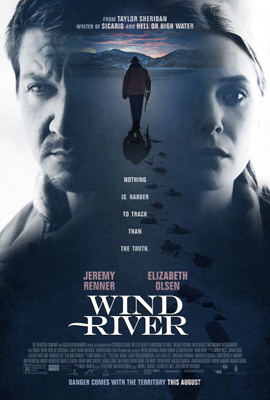 With a limited release last year, a lot of people may have missed writer Taylor Sheridan’s (“Sicario,” “Hell or High Water”) directorial debut “Wind River,” a film he also wrote and featuring Jeremy Renner in an Oscar-worthy performance. Thanks to Netflix, here’s your chance to see it.
With a limited release last year, a lot of people may have missed writer Taylor Sheridan’s (“Sicario,” “Hell or High Water”) directorial debut “Wind River,” a film he also wrote and featuring Jeremy Renner in an Oscar-worthy performance. Thanks to Netflix, here’s your chance to see it.
Set on the Wind River Indian Reservation in Wyoming, a teenage Native American girl is found dead by Wildlife Officer Cory Lambert (Renner) while following the snowy terrain tracks left by mountain lions preying on animals within the reserve. Cory’s a tracker; his job is hunting predators. Finding the girl’s body six miles away from the nearest resident isn’t the oddest thing about her discovery: her lone tracks and bare feet, black from frostbite, indicate she ran a long distance. While breathing the subzero air may have caused her lungs to rupture and asphyxiate her, Cory knows she died running from something. From past personal experience, still feeling the loss from his own teenage daughter’s murder three years before, Cory’s seen dead girls’ bodies in the middle of nowhere in this area before. Even before his fears are realized and the Native American girl’s body is found to have been sexually assaulted before she ran into the snow-covered mountains, Cory knows animals aren’t the only predators within Wind River. With the aid of the local tribal police captain (Graham Greene) and an FBI agent (Elizabeth Olsen), Cory knows he’ll have to hunt these other predators too to uncover the criminal.
In a lot of ways, “Wind River” reminded of the best Charles Bronson movie that Bronson never made: protagonist Cory Lambert isn’t far removed from other onscreen tough guys we’ve seen- men who use guns as tools of their trade and have a unique rugged expertise. While Cory’s outdoorsman acumen in tracking and knowledge of the terrain keeps you interested, his personal association with the residents of Wind River gets you invested and it’s Renner’s interaction with them, allowing us to see the chinks in Cory’s armor, that gives “Wind River” its gravity.
Taylor Sheridan’s strength as a crime drama screenwriter is not to have the crime be the key but in having us watch how the crime affects his characters- it reveals their complexities. Shown in scenes of Cory remembering his personal loss and its inherent emotion, Renner’s performance is a stand out. Whether advising the dead girl’s father (Gil Birmingham) to overcome the tragedy by embracing the pain or in recounting his own daughter’s murder to his colleague, Renner shows all of the sorrow Cory’s been burdened with beneath his stoic exterior. The fact that he hasn’t broken beneath the weight of his burden just shows us Cory’s character has character: he’s built of stronger stuff and Renner pulls this off powerfully.
As with any satisfying mystery where protagonists seek personal redemption, “Wind River” succeeds in its resolution. However, what you’ll come away with, through Sheridan’s writing and Renner’s role, is the film’s real message: survival is the strength to embrace pain. Even in Wind River’s locale, described in the film as “snow and silence,” they make that message heard.
